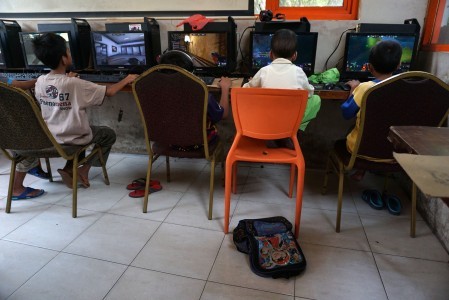Popular Reads
Top Results
Can't find what you're looking for?
View all search resultsPopular Reads
Top Results
Can't find what you're looking for?
View all search resultsDigital literacy key to children's safety online: UNICEF
Change text size
Gift Premium Articles
to Anyone
D
igital literacy must be included in the Indonesian school curriculum to better protect children from online dangers, including cyberbullying and sexual exploitation, according to UNICEF.
The development of the internet has changed people's lives significantly in recent decades, but also poses risks, UNICEF communications chief Michael Klaus said on Tuesday. Therefore, it is of great importance to push schools as well as parents to engage more in developing digital literacy as part of the curriculum as the education system plays a pivotal role.
"It's about how to best use this opportunity and reduce the risks," Klaus told thejakartapost.com in an interview, adding that the internet also benefited disadvantaged children in connecting with the world.
UNICEF child protection specialist Astrid Gonzaga Dionisio stressed that digital literacy was crucial to preventing violence that young people could encounter online, especially by instilling in them an awareness of online safety, as well as in their family members.
"Parents should also be literate, not only the children," Astrid said, adding that parenting styles must evolve to address the risks and challenges of the digital era.
Parents and caregivers also had an important role to ensure children displayed friendly behavior online, she added.
UNICEF launched an initiative called #ReplyforAll on Tuesday to invite children to participate and talk about their experiences online, to raise awareness among their friends of the issue.
The organization revealed on Tuesday the result of its global poll titled “Perils and Possibilities: Growing Up Online”, conducted from April 6 to 20 with more than 10,000 18-year-olds from 25 countries to look at the risks and realities of a connected generation.
The poll found that 80 percent of those surveyed believed adolescents were in danger of being sexually abused or taken advantage of online.
In Indonesia, where 500 18-year-olds were asked about their experiences online, the survey found that 69 percent of respondents agreed children and adolescents were at risk.
The latest poll by UNICEF was a continuation of the UN organization's global campaign to end violence against children, which was launched in 2013.
"This is actually to reiterate that children are never safe in any place," Astrid said.
When asked about the government's recently implemented harsher punishments for sex child offenders, including the death penalty and chemical castration for pedophiles, Astrid said the issue lay in the enforcement of the law.
"We actually have lots of existing regulations and legal frameworks related to child protection, but how this is enforced, I think, is another thing," she said.
UNICEF's poll showed that 85 percent of young people surveyed believed online bullying or abuse would never happen to them. Furthermore, the majority of respondents believed they knew how to protect themselves and were likely to talk to friends rather than parents when faced with online threats.
However, while children have seemingly developed mechanisms to defend themselves, a previous survey indicated they are still vulnerable to exploitation, Klaus said. Exploitation stemmed from children willingly providing private information including identity details or photographs to strangers.
Dangers online did not only take the form of sexual violence, he added. Even cases of degrading messages could have a long-term effect as the nature of the internet pointed to the difficulty of erasing content.
"Many, particularly adolescents, in this psychologically critical time, are suffering a lot from that, and suicide is definitely a big risk," said Klaus. (rin)










